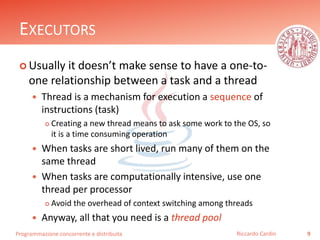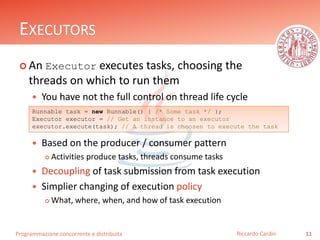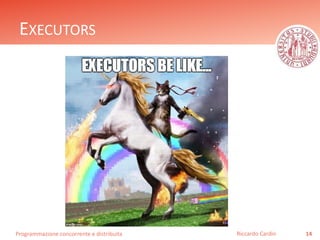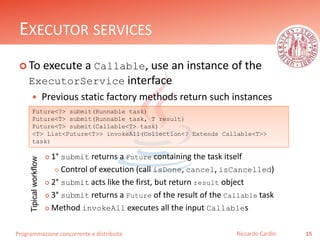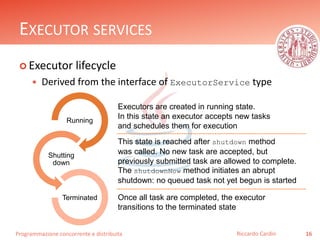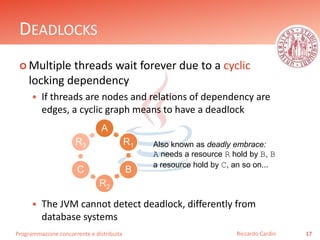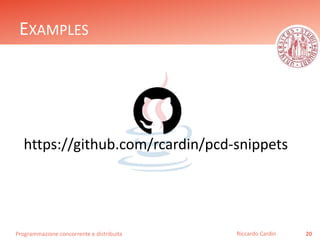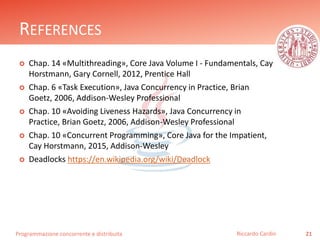Java - Concurrent programming - Thread's advanced concepts
- 1. CONCURRENT PROGRAMMING THREAD’S ADVANCED CONCEPTS PROGRAMMAZIONE CONCORRENTE E DISTR. Università degli Studi di Padova Dipartimento di Matematica Corso di Laurea in Informatica, A.A. 2015 – 2016 [email protected]
- 2. Programmazione concorrente e distribuita SUMMARY Callable tasks Futures Executors Executor services Deadlocks 2Riccardo Cardin
- 3. Programmazione concorrente e distribuita CALLABLES A Callable is a Runnable, that returns a value The Callable type is parametrized on the type of its return value Callable<Integer> represents an asynchronous computation that will produce an Integer value The value computed is not directly available We need a type to represents a value that will be available in the future... Represents a deferred computation 3Riccardo Cardin public interface Callable<V> { // The method can throw an exception, // unlike Runnable run method public V call() throws Exception; }
- 4. Programmazione concorrente e distribuita FUTURES A Future represents a computation whose result will be available at some future time Start the computation, give someone the Future object, and forget about it To obtain the result a synchronization is needed The get method blocks until the result is available Or until a timeout has been reached 4Riccardo Cardin public interface Future<V> { V get() throws . . .; V get(long timeout, TimeUnit unit) throws . . .; void cancel(boolean mayInterrupt); boolean isCancelled(); boolean isDone(); }
- 5. Programmazione concorrente e distribuita FUTURES Using FutureTask is possible to run a Callable, obtaining a Future as result Adapter of the Runnable and Future interfaces Using FutureTask is possible to run a Callable using a Thread Exception semantics ExecutionException: error during execution CancellationException: task was cancelled 5Riccardo Cardin Callable<Integer> myComputation = . . .; FutureTask<Integer> task = new FutureTask<Integer>(myComputation); Thread t = new Thread(task); // it's a Runnable t.start(); // . . . Integer result = task.get(); // it's a Future
- 6. Programmazione concorrente e distribuita FUTURES 6Riccardo Cardin
- 7. Programmazione concorrente e distribuita FUTURES A Future have some interesting characteristics Immutable Once a future is completed, it will be completed forever Lets treat asynchronous programming in a synchronous way Simplify the division of complex task into smaller ones, that can be executed concurrently 7Riccardo Cardin Future<Integer> future = /* Initialization */ ; System.out.println(future.get()); // Blocks and print 42 System.out.println(future.get()); // Prints 42 again produceSomething startDoingSomething doSomethingWithResult r
- 8. Programmazione concorrente e distribuita FUTURES 8Riccardo Cardin
- 9. Programmazione concorrente e distribuita EXECUTORS Usually it doesn’t make sense to have a one-to- one relationship between a task and a thread Thread is a mechanism for execution a sequence of instructions (task) Creating a new thread means to ask some work to the OS, so it is a time consuming operation When tasks are short lived, run many of them on the same thread When tasks are computationally intensive, use one thread per processor Avoid the overhead of context switching among threads Anyway, all that you need is a thread pool 9Riccardo Cardin
- 10. Programmazione concorrente e distribuita EXECUTORS Executors are implementation of thread pools An homogeneous pool of worker threads Amortizes thread creation and teardown Improves responsiveness, due to lack of task execution’s delay Thread pools execution using static factory methods Each method return an executor instance that implements a specific execution policy 10Riccardo Cardin // Create the thread pool with a specified execution policy Executor executor = Executors.newCachedThreadPool(); Runnable hellos = new Runnable() { /* Say hello a lot of times */ }; Runnable goodbyes = new Runnable() {/* Say hello a lot of times */ }; // Submit task for execution to thread pool executors.execute(hellos); executors.execute(goodbyes);
- 11. Programmazione concorrente e distribuita EXECUTORS An Executor executes tasks, choosing the threads on which to run them You have not the full control on thread life cycle Based on the producer / consumer pattern Activities produce tasks, threads consume tasks Decoupling of task submission from task execution Simplier changing of execution policy What, where, when, and how of task execution 11Riccardo Cardin Runnable task = new Runnable() { /* Some task */ }; Executor executor = // Get an instance to an executor executor.execute(task); // A thread is choosen to execute the task
- 12. Programmazione concorrente e distribuita EXECUTORS Execution policies Dependent on the available computing resources and quality of service requirements In what thread will tasks be executed? In what order should tasks be executed (FIFO, LIFO, priority order)? How many tasks may execute concurrently? How many tasks may be queued pending execution? If a task has to be rejected because the system is overloaded, which task should be selected as the victim, and how should the application be notified? What actions should be taken before or after executing a task? 12Riccardo Cardin
- 13. Programmazione concorrente e distribuita EXECUTORS 13Riccardo Cardin Available executors policies Method Description newCachedThreadPool New thread are created as needed; idle threads are kept for 60 seconds newFixedThreadPool The pool contains a fixed set of threads; idle threads are kept indefinitely newSingleThreadExecutor A «pool» with a single thread that executes the submitted tasks sequentially (similar to the Swing event dispatch thread) newScheduledThreadPool A fixed-thread pool for scheduled execution newSingleThreadScheduledExecutor A single-thread «pool» for scheduled execution
- 14. Programmazione concorrente e distribuita EXECUTORS 14Riccardo Cardin
- 15. Programmazione concorrente e distribuita EXECUTOR SERVICES To execute a Callable, use an instance of the ExecutorService interface Previous static factory methods return such instances 1° submit returns a Future containing the task itself Control of execution (call isDone, cancel, isCancelled) 2° submit acts like the first, but return result object 3° submit returns a Future of the result of the Callable task Method invokeAll executes all the input Callables 15Riccardo Cardin Future<?> submit(Runnable task) Future<T> submit(Runnable task, T result) Future<T> submit(Callable<T> task) <T> List<Future<T>> invokeAll(Collection<? Extends Callable<T>> task) Tipicalworkflow
- 16. Programmazione concorrente e distribuita EXECUTOR SERVICES Executor lifecycle Derived from the interface of ExecutorService type 16Riccardo Cardin Running Shutting down Terminated Executors are created in running state. In this state an executor accepts new tasks and schedules them for execution This state is reached after shutdown method was called. No new task are accepted, but previously submitted task are allowed to complete. The shutdownNow method initiates an abrupt shutdown: no queued task not yet begun is started Once all task are completed, the executor transitions to the terminated state
- 17. Programmazione concorrente e distribuita DEADLOCKS Multiple threads wait forever due to a cyclic locking dependency If threads are nodes and relations of dependency are edges, a cyclic graph means to have a deadlock The JVM cannot detect deadlock, differently from database systems 17Riccardo Cardin A R1 B R2 C R3 Also known as deadly embrace: A needs a resource R hold by B, B a resource hold by C, an so on...
- 18. Programmazione concorrente e distribuita DEADLOCKS Deadlocks rarely manifest themeselves immediatly (only in production under heavy load) Four conditions have to hold simultaneously (Coffman conditions) Mutual exclusion: at least one resource must be held in a non- shareable mode Hold and wait: a process is currently holding at least one resource and requesting additional resources No preemption: a resource can be released only voluntarily Circular wait: a process must be waiting for a resource which is being held by another process, which in turn is waiting for the first process to release the resource 18Riccardo Cardin
- 19. Programmazione concorrente e distribuita DEADLOCKS 19Riccardo Cardin
- 20. Programmazione concorrente e distribuita EXAMPLES 20Riccardo Cardin https://github.com/rcardin/pcd-snippets
- 21. Programmazione concorrente e distribuita REFERENCES Chap. 14 «Multithreading», Core Java Volume I - Fundamentals, Cay Horstmann, Gary Cornell, 2012, Prentice Hall Chap. 6 «Task Execution», Java Concurrency in Practice, Brian Goetz, 2006, Addison-Wesley Professional Chap. 10 «Avoiding Liveness Hazards», Java Concurrency in Practice, Brian Goetz, 2006, Addison-Wesley Professional Chap. 10 «Concurrent Programming», Core Java for the Impatient, Cay Horstmann, 2015, Addison-Wesley Deadlocks https://en.wikipedia.org/wiki/Deadlock 21Riccardo Cardin









